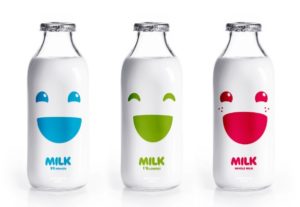 As I am walking out the door, Amy says, “Can you stop at the store and get 1% milk?” I am pre-occupied in my thoughts, but I luckily remember when I am out.
As I am walking out the door, Amy says, “Can you stop at the store and get 1% milk?” I am pre-occupied in my thoughts, but I luckily remember when I am out.
But my thoughts go to the ‘1%’ comment. How are we so confused about what fats are healthy or not? And, why are we still so infatuated with lower fat products?
Manufacturers continue to introduce lower fat foods, so there continues to be consumer demand for it. Cargill just introduced a new hybrid canola oil to reduce saturated fats.
The question is, what is the longer term trend?
For years, we have heard about how bad saturated fats are for you. Heart disease, they said. The guidelines told us to substitute animal fats with vegetable oils. All fats were clumped together as having the same bad health characteristics.
Positives of Saturated Fats
In more recent years, there has been a considerable amount of research showing that saturated fats are in actuality good for you. Sorry about the mistake!
 Saturated fats actually improve cardiovascular health. Tim Ferris’ blog has a guest post from Dr. Michael Eades and Dr. Mary Dan Eades that explains saturated fats are the only dietary means of reducing a substance called lipoprotein which correlates strongly with risk for heart disease. Also, eating saturated fats also raises the level of HDL, the good cholesterol.
Saturated fats actually improve cardiovascular health. Tim Ferris’ blog has a guest post from Dr. Michael Eades and Dr. Mary Dan Eades that explains saturated fats are the only dietary means of reducing a substance called lipoprotein which correlates strongly with risk for heart disease. Also, eating saturated fats also raises the level of HDL, the good cholesterol.
Other ways Dr. Eades shows that saturated fats are healthy for you are with stronger bones, improved liver, healthy lungs, healthy brain, proper nerve signaling, and a strong immune system.
Saturated Fat Foods
Examples of foods with high saturated fats are coconut and palm oils, dairy, cheese, eggs, fatty cuts of meat (like bacon), and butter.
Now you are seeing a rage in special high fat lifestyles/diets such as the Ketogenic diet. People are looking for fat bombs to get the fat needed to achieve ketosis.
My thought’s go back to Amy’s request. Should I get the 1% or whole milk?
A Few Negatives
Despite the recent good science regarding saturated fats, there are also a few negatives to take into account . Sarah Ballantyne, PhD, does a great job in explaining a few negatives of high saturated fats diets, including gut health and sleep. Also, people with certain genetic markers (about 20% of the population) should limit the amount of saturated fats in their diet.
Saturated Fat Long-Term Trend
I believe that saturated fats are healthy and will continue to have good upward trends in the long-term. We will find that moderate consumption is the healthiest. I give it a scale of:
7 out of 10 on my long-term trend.
Yes, I did get the 1% for the family. They are totally used to the texture of the lower fat milk. But, also, it is a matter of picking the right battles regarding health. They get plenty of saturated fats from the other foods that they eat, and the 1% milk by itself is a healthy option.
If you want to get further thoughts from me, and if you haven’t already done so, please:
